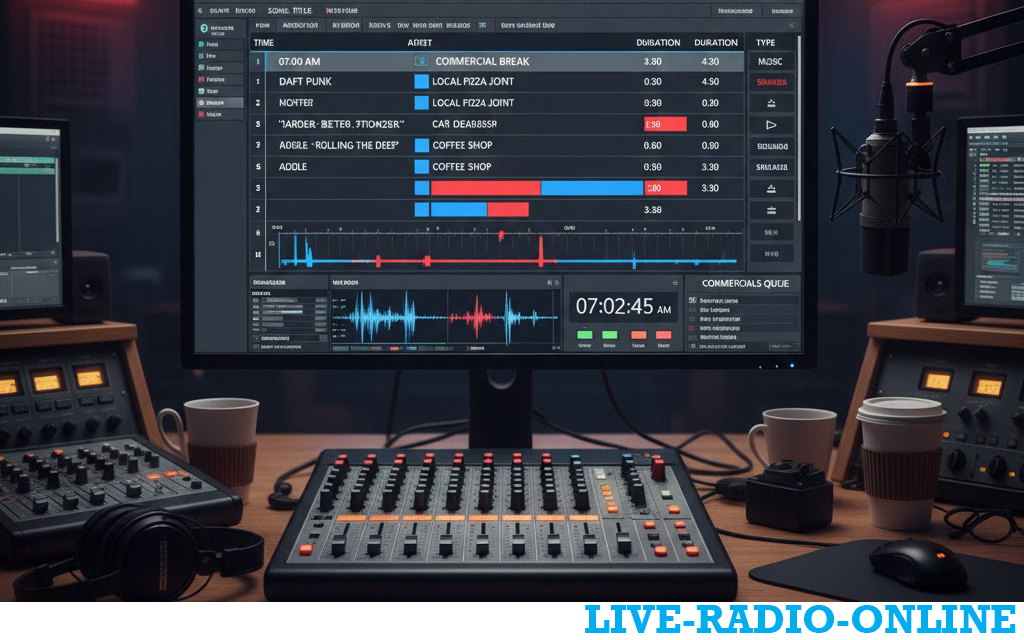
Let's expand on that to understand why it has earned that reputation and where it fits in the modern broadcasting landscape.
RCS is essentially the operating system for a radio station. It's a comprehensive software suite that manages everything from the music playlist and commercials to the live DJ's interactions and the station's connection to the transmitter.
Here’s a deeper look into what makes RCS "powerful and reliable":
The Pillars of its Power
-
Database-Driven Architecture: At its heart, RCS is a powerful database. Every song, commercial, jingle, and sound effect is logged with metadata (artist, title, tempo, genre, era, etc.). This allows for incredibly sophisticated and rules-based programming.
-
Selector Music Scheduling Integration: RCS doesn't usually work alone. It's famously integrated with music scheduling software like Selector. A Program Director builds the station's sound and clock in Selector, and RCS executes that plan flawlessly, making real-time decisions to maintain the perfect flow.
-
Zetta - The Flagship System: The modern incarnation of RCS is called Zetta. It's a networked, client-server system that allows multiple users (DJs, producers, traffic managers) to work on the same system simultaneously from different computers.
-
Feature-Rich for On-Air Talent: For the live DJ, RCS/Zetta provides:
-
Intuitive Interface: Easy-to-use screens for launching audio, managing a "cartwall" of sound effects, and seeing what's coming up next.
-
Voice Tracking: The ability to pre-record links that are then seamlessly inserted into the automated playlist, making it sound live.
-
Tight Integration with Broadcast Hardware: It works directly with playout servers, audio processors, and automation systems.
-
The Foundation of its Reliability
-
Redundancy: Professional broadcast systems are built with fail-safes. RCS/Zetta can be set up with a main server and a hot-swappable backup server that takes over instantly if the primary one fails. This is non-negotiable for stations that are on-air 24/7.
-
Stability: It's known for "just working." In an industry where dead air (silence on the radio) is the ultimate sin, a system that doesn't crash is worth its weight in gold. RCS has decades of refinement behind it to ensure maximum uptime.
-
Industry Standard: Because it's so widely adopted (by thousands of stations worldwide, from small AM stations to major iHeartMedia or Cumulus stations), it's a proven technology. Engineers know how to support it, and DJs know how to use it.
RCS in the Modern Era
The broadcasting world has changed, and RCS has evolved with it:
-
Cloud-Based Systems: While traditionally installed on local servers, there is a move towards cloud-based playout. RCS offers solutions here as well, allowing for remote access and management.
-
Multiplatform Content: A modern station isn't just an FM transmitter. They stream online, have smart speaker apps, and post to social media. RCS systems can often feed all these platforms from a single, centralized content library.
-
Competition: It faces strong competition from other systems like WideOrbit, DAD (Dalet Automation Deck), and Enco (now part of Avid). However, RCS remains a dominant and respected player, often praised for its specific focus on radio.
Summary
RCS is the "gold standard" for radio automation. Its power comes from its deep, rules-based programming and integration capabilities, and its reliability is the bedrock of its decades-long success in a live, unforgiving medium like broadcasting. It's the system that keeps the music playing and the commercials running, making the modern radio station possible.


